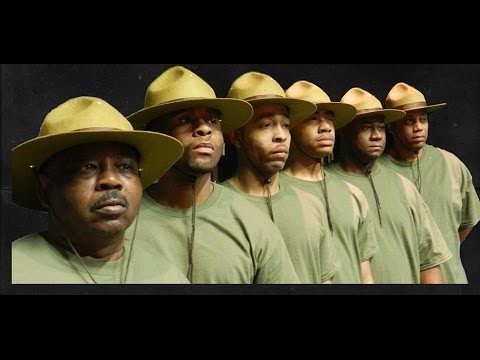Clocking in at two-and-a-half hours, Camp Logan is a play in serious need of a high and tight military-style haircut. But this humor-infused, and ultimately devastating peek inside the racial pressure cooker that resulted in the 1917 Houston riot is well worth the time investment, if only for the history lesson.
Celeste Bedford Walker’s play is more of a character study than a straightforward narrative. Inspired by actual events, it follows a platoon of black soldiers stationed at Camp Logan in Houston, TX, in the months leading up to the United States’ entry into WWI. The men to whom we’re introduced have served their country under Teddy Roosevelt and chased Pancho Villa throughout the American Southwest, but it’s clear that they are officially regarded as blacks first, soldiers second and therefore assumed to be lazy, lecherous, and unable to get by without the strictest rules and white supervision.
Camp Logan introduces audiences to class clown Gwelly (Jose Joiner), the righteously indignant Joe Moses (Kenon Walker), the appetite-driven Boogaloosa from New Orleans (Cooli Crawford), Franciscus the straight-laced MP (Jernario Davis), and Hardin (Emanuel McKinney), a young intellectual from Minnesota, inspired by the writing of W.E.B. Dubois to serve his country, and prove to the white population that his people are worthy of something better than second class citizenship. We are also introduced to the drunken white Capt. Zuelke (Bart Mallard), and Sgt. McKinney (TC Sharpe), a hard-assed drill Sgt. tasked with keeping his men from being caught in Jim Crow traps, and taking the brunt of the Army’s top-down racism.
There are two primary forces driving the action in Camp Logan. The immediate threat is rooted in the expectations of whites as Houston’s black population becomes empowered by the mere presence of certifiable African-American heroes. Blacks that won’t boot-lick and deliver service with a smile under even the most humiliating circumstances are deemed insubordinate. And over time it becomes clear that no fairly-devised plan can prevent the soldiers from run-ins with local law enforcement.
The second primary conflict is born from the fact that these black soldiers have been to Cuba and Mexico where they were treated the same as whites. There’s concern within the military that America’s enemies could easily flip black allegiance by pointing out America’s obvious inequalities. The irony, of course, is that it’s red blooded Americans and not the “German Huns” who make it clear to the soldiers stationed at Camp Logan that their war isn’t overseas.
Is there anything more disturbing than the image of an African-American performing broad race-based comedy in blackface? If there is it’s Camp Logan‘s depiction of black soldiers finding joy and empowerment in these performances for the entertainment of appreciative white audiences. Strong medicine, effectively presented.
In real life things in Houston came to a head when two Houston police officers broke into the home of an African American woman, dragged her partially naked into the street, and assaulted her in front of her children. When military men interfered they were shot at and beaten. Although all of this happens off-stage Camp Logan follows this basic narrative, stressing the psychological effect of constant dehumanization.
The slow-moving nature of Walker’s’s play requires some patience. This is exacerbated by a fantastic cast that’s still struggling to find firm footing in a meandering piece. But patience will be rewarded with an incredible story that’s been all but swept underneath the rug of history.
Those keeping up with the news have no doubt encountered the story of Cliven Bundy, the rancher who became a Conservative folk hero following a standoff with Federal troops. Bundy lost some of his strongest public supporters when he said out lout what smarter politicians prefer only to say by way of deracialized public policy: Blacks might be better off in slavery. This idea, which has never gone away, comes from the belief that without the great white father to take care of them and encourage them to work a little harder than they might on their own, blacks fall into savagery and dependance. This recently-expressed idea is a guiding principle at Camp Logan. The namesake play strongly, and perhaps even unintentionally, suggests that maybe things haven’t changed as much as so many of us seem to think they have.
The Bluff-City Tri-Art Theatre Company is dedicated to producing new and lesser-known works. Camp Logan is a great example of just how valuable our independent-minded companies are, even in a fairly rich and diverse theater environment. For details and ticket information click here.
